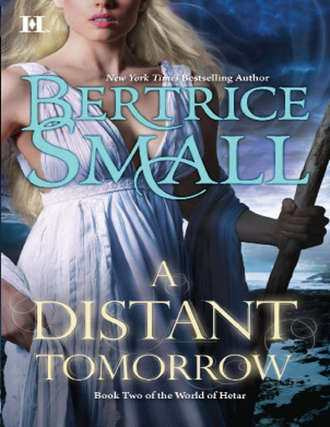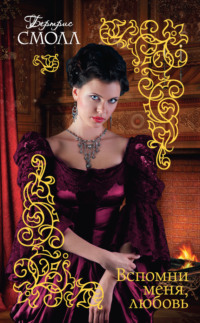
Полная версия
A Distant Tomorrow
Lara dipped her hand into the small square pool. The water was warm and scented with yellow primrose. With a smile Lara pulled off her boots and stripped off her leather pants, her vest and her shirt. Not even bothering to pin her hair up, she stepped naked into the pool with a deep sigh of pleasure. There was nothing like a warm bath. Finding the seating ledge she sat down, and just enjoyed the sensation of the water lapping against her skin. There was an alabaster jar of soft soap on the side of the tub, and a large sea sponge. Lara filled the sponge with soap, and washed herself in the lavishly rich cleansing agent. Then she washed and rinsed her golden hair, wishing that she had a lemon to squeeze into it in a final rinse. No sooner had she thought it than there was a cut lemon on the edge of the bathing pool. Laughing, she squeezed it into her hair, laving clean water from the curved shell faucet over her head.
But then the pool was swiftly draining itself. Sprays of water shot from small recessed spigots in the pool wall, rinsing her off. She bent to let the water cleanse the last of the lemon from her head before the bathing pool refilled itself with scented water. Lara relaxed as she watched the golden coastal moon rising higher, and was lulled by the sound of the waves below the great palace.
When the sky was finally dark she walked back into her chamber to find the lamps had been lit, and a small fire was burning in the little hearth opposite her bed. Drying herself with the large drying cloth she found warming on a rack by the fire she slipped on a loose night robe. Her pack had been brought to her chamber, and opening it she drew out the beautiful gold brush that Kaliq, the Shadow Prince, had once given her as a lover’s token. Seating herself on a small velvet hassock by the fire she brushed her hair dry. She was finally beginning to feel sleepy. Lara climbed into the large comfortable bed draped in coral and gold silk curtains. What would tomorrow bring, she wondered? And how long would she remain here in Archeron’s palace? Her eyes closed slowly of their own volition.
She awakened with the dawn, and rose to see the sunrise from her terrace. She had slept a sound and dreamless sleep. For the next few weeks Lara’s days were relatively the same. She awoke, ate her morning meal upon the marble terrace and then walked about the town belonging to King Archeron’s palace. The lords of the coastlands had long ago decided that each of their leaders would be a king with his own palace and village. It saved a great deal of debate, and the oldest of the kings was always recognized as their High King, no matter the family from which he came.
The palace was white marble, with soaring towers and gold-leafed domes. The town into which it blended was much the same. The windows of the houses overlooking the streets were bright with flower boxes holding blooms of every size and hue. The stalls in the market square were clean and filled with goods being hawked from beneath multicolored awnings.
Lara had no need of coin. If she saw something she admired it was pressed into her hand. She returned the kindness with a faerie blessing, which she learned was far preferred to silver or gold. And everyone knew who she was. The daughter of the great Crusader Knight, John Swiftsword, and a faerie mother, although her mother did not matter to the Hetarians. Nor did her sojourn in the Outlands where it was rumored she had mated with, and given one of the men there children. She was still the great beauty that she had been reputed to be.
In the afternoons Lara would ride along the beach with King Archeron, and in the evenings they would dine together. Often their evenings were spent in conversation. Other times they would play a board game similar to the one she had played with Vartan.
And then one evening Archeron announced to his guest that his son and heir, Arcas, would soon be returning from the City.
“No one travels the old-fashioned way any longer,” he told Lara. “The representatives are now all transported to and from the City by means of magic.”
“With whom has he served?” she asked, curious.
“King Balasi,” Archeron answered. “His is an old and very respected family. But I find him easily led, and perhaps a bit foolish. When it is his turn to serve on the High Council in the City we always see he is sent with someone strong who is able to direct Balasi without his being aware of it. He is unable to cause difficulties then, for he is a pompous, self-important man. My son has never forgotten you, Lara.”
“I did not say it when I was last here, but Arcas offended me deeply,” Lara told her gracious and kindly host. “But perhaps it was just his enthusiasm that caused him to act in the manner in which he did.”
“What did he say?” Archeron was distressed by her revelation.
“He made reference to my slavery, and then he touched me in an intimate manner,” Lara said quietly. “I did not speak gently to him.”
“I am sorry,” Archeron replied. “But then, as you have considered, surely it was just his enthusiasm at meeting you that caused his breach of manners.”
Lara nodded in seeming agreement with the king, but she knew Arcas’s behavior had been caused by little more than his lustful nature. She was not looking forward to meeting him again. “There is a question that I have wanted to ask you ever since I saw the Sea of Sagitta again,” she began.
“I will answer your query if I can,” he said, glad to be off the subject of Arcas.
“What is on the other side of your sea? And why is naught said about it?” Lara looked directly at King Archeron as she spoke.
He chuckled. “No one has ever asked that question of me,” he began. “How clever of you, Lara, to consider such a thing. Hetar believes it alone exists, but for the Outlands, which Hetar has declared a savage place in order to make itself seem more civilized and important. It is a very narrow view. But on the other side of the sea is a land its inhabitants call Terah. It is ruled over by the Dominus of the Terahn Dominion. It is from there our luxury goods come—the fabrics, the jewelry, the fine china and pottery, the objects of gold and silver. We trade the salt we produce, the pearls we harvest from the sea, and the coin we earn by selling Terahn merchandise in exchange for more of their goods. Gaius Prospero is unconcerned with where we obtain these things. He only desires them to gain more profit for himself. He assumes we manufacture these goods ourselves, and few from the City or any other part of Hetar have ever come to the Coastal Kingdom. All of us keep much to ourselves, and the City is the only place where we meet and mingle. Those across the sea are our secret. Now you know it, and you must keep that secret. We should lose our great advantage over the City if this was known to them.”
“I will keep your secret,” Lara said. “Have you ever been to Terah, Archeron?”
“No,” he replied. “The Terahns do not permit strangers into their lands. We meet these fellow traders in the middle of the sea and there we exchange our goods.”
“How did the Coastal Kings find the Terahns?” Lara wanted to know.
“That is the odd thing about our relationship,” Archeron responded. “No one knows how it all began. There is nothing in our history to explain it, yet for centuries we have traded with them, and they with us. I remember asking my grandfather when I was a child, and he just shook his head, and told me that it had always been, and would always be. And the Terahns’ knowledge of this partnership is no greater than ours.”
“How strange,” Lara remarked. “Haven’t you ever wanted to know more about the Terahns, Archeron? Haven’t you ever wanted to see their land, and if it is as beautiful as here? Haven’t you ever wanted to meet them face-to-face?”
“Oh, I have met Terahns,” he told her. “When I was younger I often captained one of my family’s ships to the meeting place, and did business with their captains. I even met on several occasions the man who is now the Dominus. I met him as a boy. He is Magnus Hauk. A serious lad as I recall, and I am now told, deeply passionate about keeping the Dominion strong.”
“It is interesting that these Terahns have never considered invading Hetar, or the fertile plains of the Outlands,” Lara mused.
“Their own lands are said to be gloriously beautiful, but of course we have but their word for it as they have ours.” Archeron smiled. “Actually, we know little of them, for they keep very much to themselves as do we. I do not believe they are an aggressive people. And they have never evinced any real interest in Hetar.”
“How curious,” Lara noted. “Perhaps these people are much like us.”
“I could not tell you, for we do nothing more than trade. Prices are set for the goods in advance. We exchange cargos and go our separate ways. Sometimes, however, we might share wine or a meal together,” Archeron said. “Not often, but now and again. It depends upon the captain with whom our own captain does business.”
“So Terahns are not unfriendly,” Lara said. “I wonder why it is you have never really made friends with them, Archeron.”
He shook his head. “Trade is our only link, Lara.”
As she lay in her bed that night Lara said to her crystal guardian, Ethne, I am curious as to the land on the other side of this sea.
Then go there, Ethne replied.
Should I? Lara wondered. And since when have you begun to give me direction again? You have been insisting I make my own decisions for some time now.
But this is a new direction for you to take.
Will I be protected if I go to the other side of this sea? Does magic function on that side of the sea, Ethne?
Magic acts everywhere, Ethne responded dryly. How many times have I told you, Lara, daughter of Ilona and Swiftsword? You are protected. Wherever you go, my child, you are protected.
Because I have a destiny. And Lara chuckled aloud.
Ethne laughed softly, but agreed. Aye, because you have a destiny.
But what is that destiny? Lara demanded once again.
Follow your instincts, my child, and you will learn it. Then the flame in the little crystal flickered and banked low. Ethne had no more to say.
Follow her instincts. Her instincts were not telling her a great deal these days, and she was becoming bored living in King Archeron’s palace. She was accustomed to being useful, and she was not useful here. But she was now extremely well rested. Four months had passed since Vartan’s murder. The Gathering was now over, and the clan families of the Outlands were preparing for winter. Did the Fiacre miss her? Did her children miss her?
Dillon would, Lara knew. But her daughter? Anoush would have probably forgotten her by now, and would be looking to Noss as her maternal figure. Noss was a good mother. But I miss my children, Lara considered. Sometimes I hate this mysterious destiny that has taken them from me. She cried softly for a short time, and then slept restlessly.
The next few days she spent most of her time out of doors, for she suddenly could not bear being confined within the palace. She walked the beaches for miles, and then walked back again. But for the waves and the seabirds soaring above her, all was quiet. The grassy dunes above the beach were golden with the cooler weather, but it never became truly cold here along the sea.
One day Lara had ridden several miles from the palaces and towns of the Coastal Kings when curiosity directed her mount up into the dunes. She rode on as the dunes gave way to a wide swath of green land, and saw beyond it gently rolling hills. All of it was empty of domesticated animal, or people. There wasn’t a house or a field to be seen in any direction. Here was certainly land enough for Hetar’s burgeoning population. She wondered why it was not being utilized. Another question for Archeron to answer, she thought, stopping to gaze all around her. She turned her horse back toward the sea, and rode back to the palace. The day was becoming gray with an impending storm.
Why was it, Lara wondered, that as each day passed she was finding far more questions than answers? She asked Archeron about the fertile lands beyond the beach.
“We do not choose to allow strangers to inhabit our land,” he answered her.
“But they are your fellow citizens of Hetar, my lord king,” Lara said.
“They are people of the City and the Midlands,” Archeron replied. “Hetar’s provinces are almost equal in size. If we allowed the overflow from the City and the Midlands to come here we would lose our lands. They would crowd us out. They would want to enter our towns, and they do not understand us so they would cause difficulty. Eventually someone would learn the secret of our trading custom. They might even want to build their own boats, and sail upon the Sea of Sagitta. No. We will not allow our open land to be exploited by the folk from the City.”
“The land lies useless. Why not farm it yourselves, and sell what you do not need to the City?” she suggested.
Archeron shook his head. “The land has always been just the land,” he told her. “We are not farmers, Lara. We are traders.”
Lara was astounded by his attitude. The Coastal Kings possessed great riches, and yet they had never shared these riches, nor did they want to share them. In the years since she had left the City, much had changed if the gossip was to be believed. The government was beginning to encroach upon the forest and the edges of the desert, yet here was all this unused land going to waste. She wondered if all the Coastal Kings felt the same way that Archeron did, but then, he was High King, and perhaps he was right. But it was a question she was going to ask Arcas when he arrived home.
Chapter 4
GAIUS PROSPERO looked across the table at his guest. His thick fingers closed about the stem of the jeweled goblet by his right hand. He lifted it to his lips, and sipped the wine within appreciatively. “So, you depart tomorrow, Arcas.”
The young Coastal King nodded. “In the morning.”
“And you will not forget your promise to support me in the vote before you go?” Gaius Prospero’s cold dark eyes narrowed as he looked at Arcas.
“You have my vote, my lord,” Arcas said. “Though the council is disbanding for a recess, I will return when it reopens again.”
Gaius Prospero nodded, satisfied. “I am told that the widow of the Outlander, Vartan of the Fiacre, is visiting with your father. It is said he is quite taken with her beauty. Lara is an ambitious girl, and now that her little orgy among the savages is over with, I suspect she looks to wed higher. The passage of years makes it impossible under our laws to enslave her again. She would even be safe in the City now. But perhaps living by the gentle sea suits her better. An old man could be tempted by such faerie beauty, and her magic could make an elder potent again. If she loved him, she might even give him a child.” He smacked his lips appreciatively. “I would have liked to have her, but I could not bring myself to squander half her value just to satisfy my lustful cock.” He chuckled.
“Do you have spies everywhere, my lord Gaius?” Arcas asked his host dryly.
“Everywhere,” Gaius Prospero agreed with a smirk. “I hear your father and Lara ride each afternoon along the beach. The soft earth would certainly make a good bed.”
“It does,” Arcas answered, not showing his irritation. “I’ve taken many a girl in the dunes by the sea, my lord Gaius.” Was the smug and power hungry Master of the Merchants suggesting that his father was Lara’s lover? The thought that his father might have gotten what he could not have infuriated Arcas. A long time ago Lara was meant to be his personal Pleasure Woman, but that the Head Forester had seen her and paid an obscene sum to possess her. When Arcas had learned of Vartan’s death several months back from the ubiquitous Jonah, Gaius Prospero’s valued right hand, he had begun to consider the possibility of having Lara for his own again. Once he had told her he would never have kept her as a slave—but that had been a lie. If he could have her, he would imprison her in his apartments and never let her free. She would be only for him. For his pleasure. For his eyes alone.
To consider that his father had gotten there before him was a thought not to be tolerated. Archeron was newly widowed of Arcas’s mother. Could he have loved Alina, and been so quick into another woman’s bed? Yes, he could, if the woman was Lara! And Gaius Prospero knew it or he wouldn’t have said it. Arcas thought the Master of the Merchants had actually enjoyed imparting the information to him. Damn Gaius Prospero to Limbo, he who intended packing the new High Council with his adherents, and having himself elected emperor of Hetar! But the pleasant smile Arcas wore never faltered. Finally he arose.
“I should be getting back to the Council Quarter,” he said. “King Balasi and I want to depart early. I will see you in a few weeks, Gaius Prospero. My felicitations to your two wives, the lady Vilia and the lady Anora.” Then with a bow he left Gaius Prospero. He did not look back, or raise his hand in farewell.
The Master of the Merchants smiled to himself as his guest departed. He had been unable to resist taunting King Arcas with thoughts of his father and the beautiful half-faerie woman. He knew how very much the younger man desired Lara. When the Winter War of five years ago had ended, and Gaius Prospero had gathered all the information he needed to learn how he had failed to annex the rich mountain region of the Outlands, the Master of the Merchants had discovered that the daughter of the Crusader Knight known as Swiftsword was responsible in great measure for his defeat. It was she who had advised the Outlanders against him. At first he could not believe it. He had been amazed that the exquisite creature he had bought from her father to sell into one of the great Pleasure Houses of the City had become such a skilled warrior and strategist. Once he had lusted after her himself, but now he considered her his enemy. He would have his revenge on her for that earlier defeat, and engineering her husband’s death was just the beginning. And yet he wondered, if she came into his life again, would he still desire her?
It had taken five years to regain his popularity among the people. Five years to quiet the outcry against him by his fellow magnates, to calm the leaders and men of the Mercenary Guild. Seven carts piled high with Hetarian dead driven into the heart of the City was not a memory easily erased. And though they had buried those unfortunate dead quickly in mass graves, the stink of their rotting bodies had lingered in the air for days, reminding everyone of just what had happened—and who was responsible.
It hadn’t been his fault, he convinced himself. But he had been unable to ride out in the streets for weeks afterwards. On the rare occasions he had ventured out, surrounded by mercenaries paid to protect him, people had cursed him and thrown refuse at him. He could never forget that, nor would he forget those who had turned away from him in those wretched streets, or refused to return his messages. He knew they plotted against him, but most were still fearful of his wealth, which could yet buy death for Gaius Prospero’s enemies. They might hate him, but he still wielded some small power.
The Head Mistress of the Pleasure Mistresses’ Guild owed him a great favor for having sent Lara from the City to be sold. She had come to him some months after the Taubyl Trader had taken the faerie girl away and told him so. He had not wanted to see her, but Jonah had convinced him otherwise, reminding him that to lose the lady Gillian’s favor was an error he did not want to commit.
“You do not want to lose her allegiance, my lord. There will come a day when you can hold her to account, but now is not the time.”
So Gaius Prospero had welcomed the lady Gillian, and offered her refreshments and listened while she apologized to him.
“I know you are angry, Gaius, and disappointed by my decision in the matter of the faerie girl, Lara, but she really would have been too dangerous a possession for any of our Pleasure Houses to hold.”
“You have cost me a fortune,” he had grumbled at her. “I had to buy Vilia a new cart and horses to match. I had promised her, and had I not purchased them she would have complained, and many would have believed I couldn’t afford them. And the girl ended up escaping from the Forest Lords, and in the end has led this Winter War, which has almost destroyed me, Gillian. The monetary loss is bad enough, but worse, my prestige has been threatened.”
“Gaius, Gaius,” she murmured soothingly. Then she had come and sat in his lap and begun kissing him with slow, hot kisses. Her tongue slipped into his mouth to play with his. One arm curled about his neck, while her free hand found the opening in his robes, and began to fondle his sex. When it was rigid the lady Gillian positioned herself so that she might absorb his fleshy cock into her body. “There now, Gaius, isn’t that nice?” she purred at him. “I know taking pleasures cannot really make up for your loss, but I want you to know that despite everything that has happened I still consider you my dearest friend, and I will always ally myself with you in whatever endeavor you pursue. And I will advise the Guild of the Pleasure Women to follow my lead as well.” Her arms wrapped about his neck, and she tightened the muscles within her sheath around him.
Gaius Prospero groaned with pure delight. When she leaned back he reached out and fondled her large breasts beneath her gown. “Gillian, you are an amazing woman,” he told her. “Now ride me to ecstasy, you delicious bitch, and I will consider forgiving you.”
And so she had, and while she did Jonah watched with both amusement and interest. The Head Mistress was a powerful friend to have, and Gaius Prospero would have been foolish to make her an enemy. After she had gone, Gaius Prospero had admitted as much to Jonah. With her allegiance assured, Gaius Prospero set about rebuilding his alliances.
He soothed the Guild of Mercenaries and the Order of the Crusader Knights with promises for the future. They would take the Outlands, but first they must rebuild their forces. It would take time and careful preparation, Gaius Prospero told them. Hetar would not fail again. They had moved too quickly before. This time, he would put all his own personal resources at their disposal, and Hetar would triumph.
With Jonah by his side, Gaius Prospero had worked out just how the acreage belonging to the Outlands would be divided up. Jonah cleverly divined just whose aid was most needed by his master. They were given their choice of land or slaves. And of course, the Midland farmers must be given land as well. Each year the old farms produced less, for the earth was tired, and this condition was causing a scarcity of foodstuffs. New farms needed to be opened up, new orchards planted, new pastures sown for grazing.
It had been difficult for Gaius Prospero in those early days following Hetar’s defeat.
But Gaius Prospero had managed to keep his head above the water in those dark days. And much of his success was due to his former slave, Jonah. Jonah was clever, and he always looked ahead. Although he prided himself on his own mental skills, Gaius Prospero was not above using the abilities of others, and in Jonah he recognized an ambitious man. Better to have that man on his side. He had offered Jonah his freedom on the condition he remain with him for a term of ten years. It was not a verbal agreement, but one that was written down, and signed by both parties. Jonah even insisted on paying his former master the price of a sturdy male slave in order to make certain the transaction was completely legal and could not later be challenged. Two copies were made, one to be held by Gaius Prospero, the other by Jonah—although the Master of the Merchants did not know where his former slave kept his copy.
And so, working together they had struggled to rebuild Gaius Prospero’s reputation. It had taken longer than the Master of the Merchants had thought it would, and it had certainly cost him a great deal more in hard coin than he had thought to spend. He had opened his storehouses to feed the many poor in the City during the winter months. He had given free entertainments in the public stadium, and held races open to the public with prizes that while unimportant to him were considered generous by the people. And he had taken a second wife in a public spectacle that delighted the City and had capped his return to favor.









